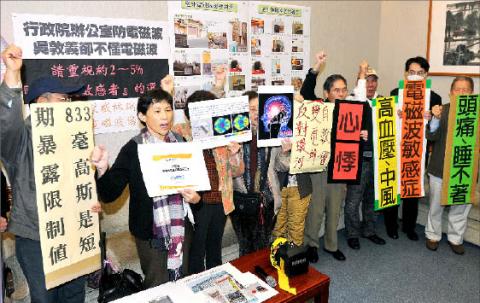The Taiwan Electromagnetic Radiation Hazard Protection and Control Association yesterday urged the presidential candidates to pay more attention to the issue of electromagnetic waves and pass laws to protect people from their harmful effects.
The call came amid a claim by People First Party vice presidential candidate Lin Ruey-shiung (林瑞雄) that he was attacked by 18,750kHz electromagnetic waves for three consecutive nights from Sept. 20.
Lin said he had to move from his residence to a hotel because of the attacks, adding that he knew it was an electromagnetic radiation (EMR) attack because he is an expert in the field.

Photo: CNA
The National Security Bureau has rebutted Lin’s statement and quoted the National Communications Commission as saying that neither the military, the bureau nor any other government agency had applied to use the 18.75MHz or 1,875MHz frequency.
At a press conference yesterday, association chairman Chen Chiao-hwa (陳椒華) said the WHO has noted an increase in the number of individuals who are sensitive to EMR because of the rise in the number of base stations.
Citing a report from Sweden, Chen said the Swedish government had identified 2 percent to 5 percent of its population who demonstrated symptoms of being sensitive to electromagnetic radiation.
A dozen residents living close to electric power stations also attended the press conference and said the EMR from the power stations in their neighborhoods was the source of their sufferings, ranging from leukemia and cancer to depression.
As the vice presidential candidates are holding their televised debate today, Chen said that one of the questions should be directed at Premier Wu Den-yih (吳敦義), the running mate of President Ma Ying-jeou (馬英九), regarding his understanding of EMR.
Chen said the Cabinet and other government agencies had spent taxpayers’ money on projects to reduce EMR in buildings, but Wu has said he does not know much about it.
Chen also encouraged Lin to share his knowledge about EMR.
“As a public health expert and vice presidential candidate, Lin should speak out louder than anybody else [about the hazards generated by EMR],” Chen said. “Not only did he have to flee [from the EMR], he should also show us how to flee.”

Chinese spouse and influencer Guan Guan’s (關關) residency permit has been revoked for repeatedly posting pro-China videos that threaten national security, the National Immigration Agency confirmed today. Guan Guan has said many controversial statements in her videos posted to Douyin (抖音), including “the red flag will soon be painted all over Taiwan” and “Taiwan is an inseparable part of China,” and expressing hope for expedited reunification. The agency last year received multiple reports alleging that Guan Guan had advocated for armed reunification. After verifying the reports, the agency last month issued a notice requiring her to appear and explain her actions. Guan

GIVE AND TAKE: Blood demand continues to rise each year, while fewer young donors are available due to the nation’s falling birthrate, a doctor said Blood donors can redeem points earned from donations to obtain limited edition Formosan black bear travel mugs, the Kaohsiung Blood Center said yesterday, as it announced a goal of stocking 20,000 units of blood prior to the Lunar New Year. The last month of the lunar year is National Blood Donation Month, when local centers seek to stockpile blood for use during the Lunar New Year holiday. The blood demand in southern Taiwan — including Tainan and Kaohsiung, as well as Chiayi, Pingtung, Penghu and Taitung counties — is about 2,000 units per day, the center said. The donation campaign aims to boost

A preclearance service to facilitate entry for people traveling to select airports in Japan would be available from Thursday next week to Feb. 25 at Taiwan Taoyuan International Airport, Taoyuan International Airport Corp (TIAC) said on Tuesday. The service was first made available to Taiwanese travelers throughout the winter vacation of 2024 and during the Lunar New Year holiday. In addition to flights to the Japanese cities of Hakodate, Asahikawa, Akita, Sendai, Niigata, Okayama, Takamatsu, Kumamoto and Kagoshima, the service would be available to travelers to Kobe and Oita. The service can be accessed by passengers of 15 flight routes operated by

The Central Weather Administration (CWA) said a magnitude 4.9 earthquake that struck off the coast of eastern Taiwan yesterday was an independent event and part of a stress-adjustment process. The earthquake occurred at 4:47pm, with its epicenter at sea about 45.4km south of Yilan County Hall at a depth of 5.9km, the CWA said. The quake's intensity, which gauges the actual effects of a temblor, was highest in several townships in Yilan and neighboring Hualien County, where it measured 4 on Taiwan's seven-tier intensity scale, the CWA said. Lin Po-yu (林柏佑), a division chief at the CWA's Seismological Center, told a news conference